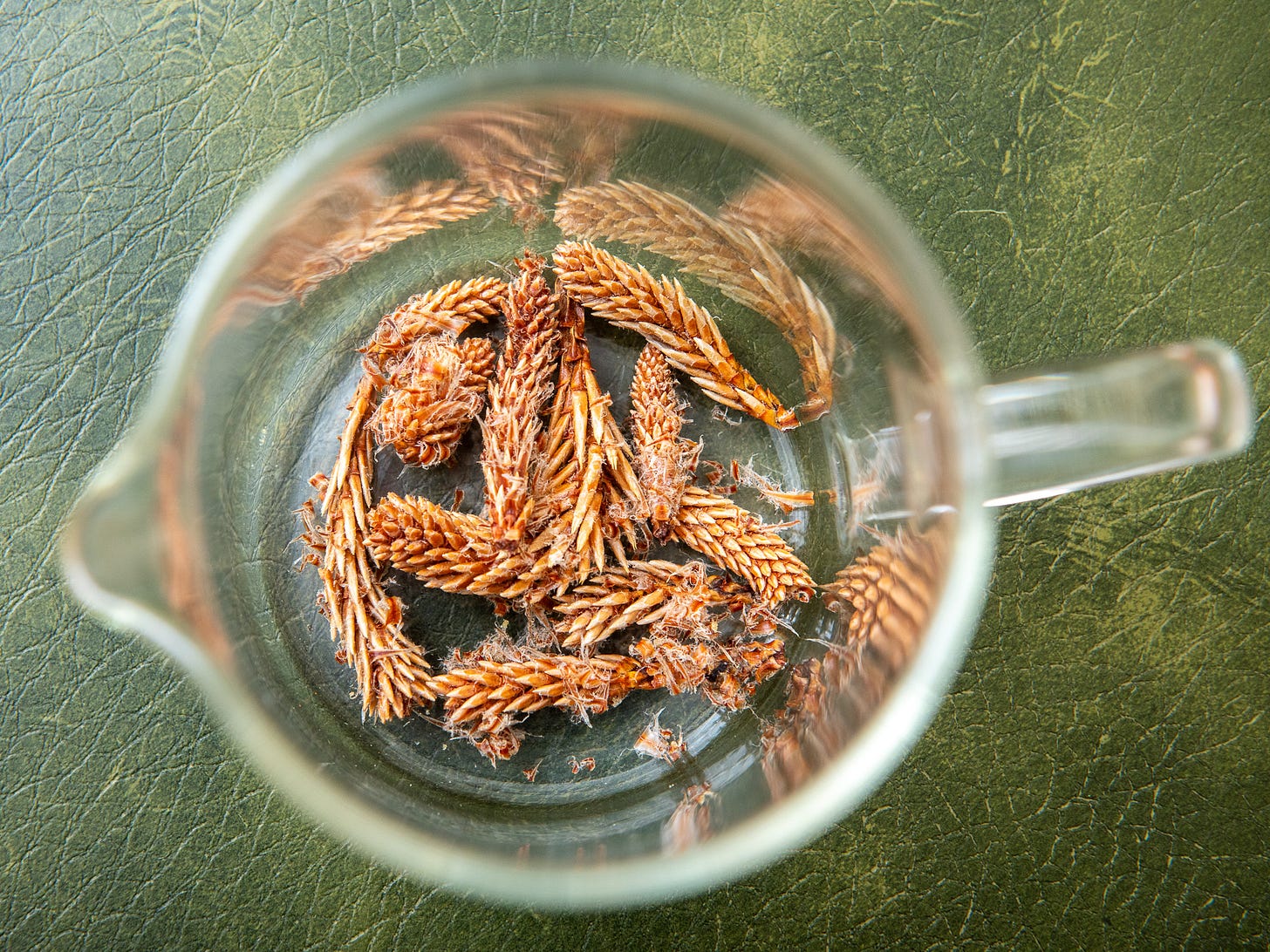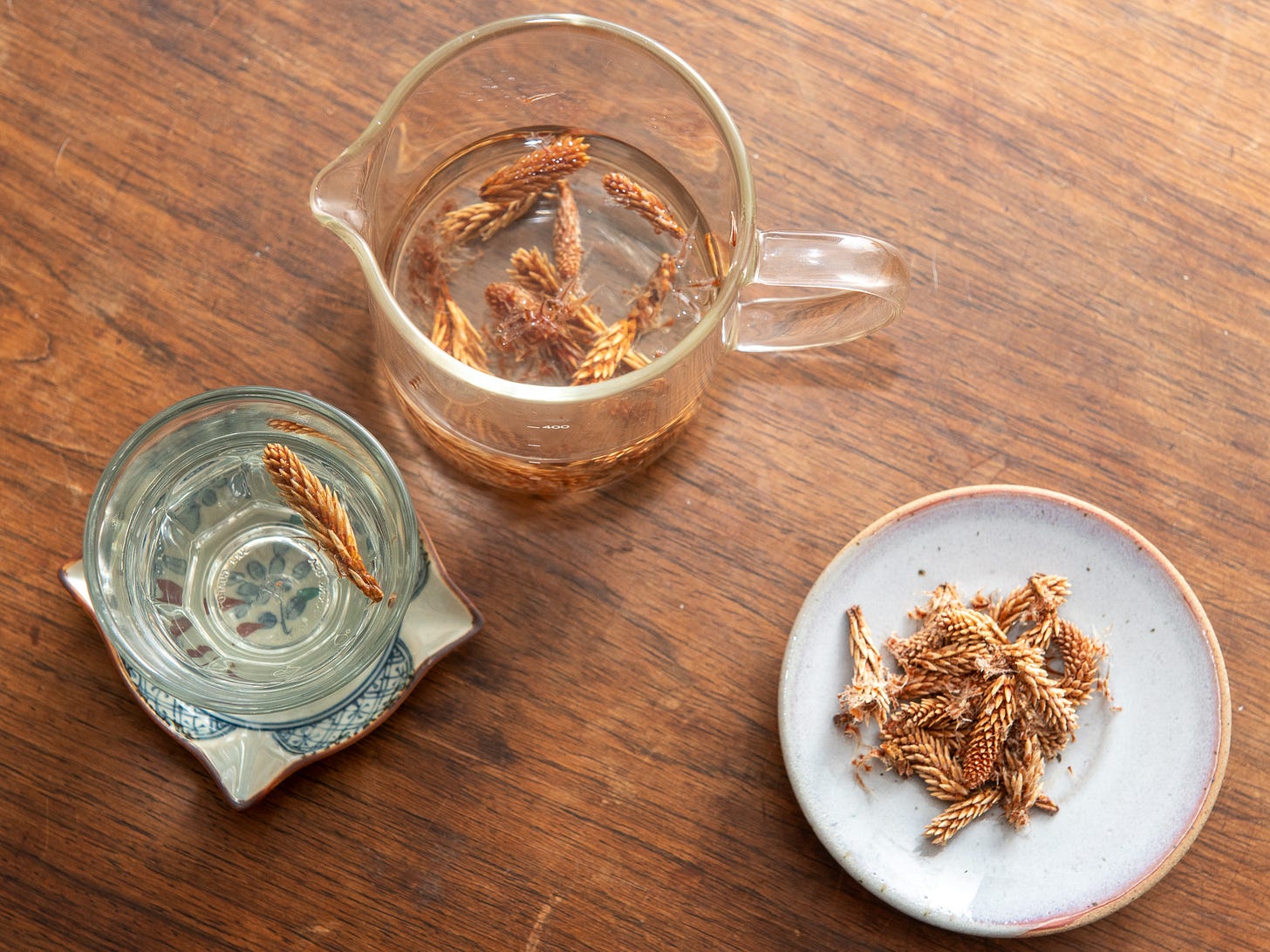Is tea from bigger companies safer?
Sinus clearing sips of pine + Ask a Tea Person advice on the state of American food safety.
Pining for some good buds
The tea: Dried pine buds, sold by Hickory Nuts Direct on Foraged.com. $9.99 for 1oz.
Pine trees get excited during early spring. As temperatures warm and hormones begin to flow, the bud tips engorge with sap and elongate into thin poky growths. These are sometimes called candles for their wick-like appearance that wave back and forth above bushy bundles of needles. Eventually, these buds burst forth with a new generation of needles. But if you lop the candles off beforehand and dry out the severed buds, you can capture the pine tree’s first flush of growth in a form that makes a potent herbal tea.
Pretty much every community in range of naturally growing pine trees takes advantage of these living apothecaries. Pine buds, needles, sap, bark, and wood are loaded with practical and medicinal uses. The buds in particular are rich in vitamin C and said to reduce congestion. I’ve been going through it with spring allergies, and while I’m not about to ditch my Zyrtec, sipping this fragrant piney brew did seem to provide my inflamed airways some temporary relief. If I ever win the lottery, I’m filling a steam room with pine buds and bringing a kettle inside.
The source: I picked up these pine buds from Hickory Nuts Direct, a Wisconsin company that specializes in locally foraged black walnuts and hickory nuts. (Imagine a butter pecan flavored walnut, then imagine that in a chocolate chip cookie.) You can also find pine buds from Valley of Tea and SF Herb & Spice; I can personally recommend the latter as a warehouse of uncommon bulk herbs. Most pine buds on the market come from Eastern Europe, where they’ve long been used in medicinal teas. Of course you can also harvest your own if you live near a pine tree. Seek out fat buds from girthy branches and dry them near a fan or in your oven on the lowest possible heat. Fully grown needles yield similar flavors and volatile compounds but the juvenile buds are the most concentrated.
To brew: No need to measure dosage precisely with pine buds—prolonged heat matters more than exact quantities. A small handful steeped in 300 milliliters of boiling water for 5 minutes results in a thin but aromatic brew redolent of earthy pine and hints of fruit and citrus. You can steep up to 15 minutes for a stronger drink or gently simmer buds on the stove for 30 minutes. I found that simmering traded the pine’s fruity subtleties for a sappy bitterness. Play around with your preparation and add a glug of dark honey for complementary flavor and textural richness.
Ask a Tea Person: Do small tea companies skimp on food safety?
Welcome back to Ask a Tea Person, Leafhopper’s tea advice column. Check out previous editions here and submit your own questions by emailing max.falkowitz@gmail.com with “Ask a Tea Person” in the subject line.
I am a neophyte tea drinker having switched from coffee about a year ago and having tried many types of loose tea primarily from what I would call mass market producers (Harney and Sons, Republic of Tea, etc...). Your emails have opened up a whole wide world of tea and tea producers that I am eager to try. But the number one thing that concerns me about being more adventurous or purchasing more "exotic" tea is the safety.
I know that all imports have to go through a "strict" FDA screening but not sure that is the standard I want to rely on. I know probably a huge topic but would you be so generous as to provide some simple guidance to someone eager to explore outside of the big box teas I'm currently drinking. — Robert S.
This is a worthy question to consider, Robert. I remember listening with horror to an insider at an herbal tea startup describe how the company founders tried to soft-peddle a batch of product that contained well over the legal limit of human fecal matter. The company was eventually acquired by a major brand and discontinued, I assume for reasons unrelated to poop. A beverage company’s first priority should be ensuring a food-safe supply chain. Do larger businesses with greater resources do a better job? Not necessarily.
Keep reading with a 7-day free trial
Subscribe to Leafhopper to keep reading this post and get 7 days of free access to the full post archives.







